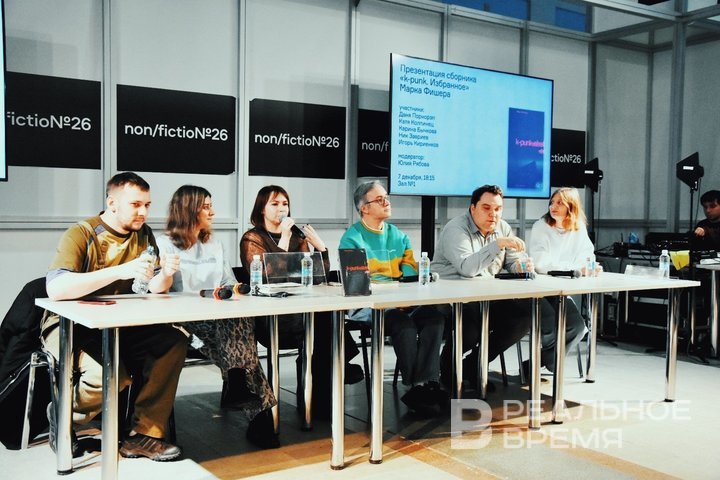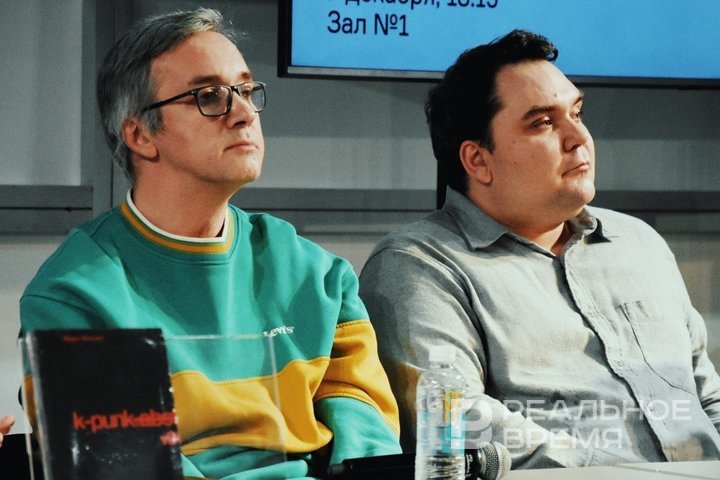Mark Fisher: from k-punk blog to critical theory icon
How the British music critic shaped a new culture and what he criticised capitalism for

What do depression and political cynicism have in common? Mark Fisher convincingly demonstrates that all these phenomena are related to the deep structural features of modern life. His collection of k-punk articles published by Ad Marginem is not just a critique of capitalism, but also an attempt to find paths to something new, despite the hardships of reality. How did he manage to create a cultural legacy that is being discussed even eight years after his death? This was discussed at the presentation of the collection at the non/fiction№26 international fair of intellectual literature.
“A place where literature, music and cinema acquired hidden meanings”
Mark Fisher was born in 1968 into a working-class family. From a young age, he was aware of the peculiarities of class differences and the nature of culture. A simple boy from a local comprehensive school, he listened to post-punk and read articles from NME, where music was intertwined with politics and literature. Studying philosophy and English literature at the University of Hull laid the foundation for his path in academic research. At the University of Warwick, he delved into work on gothic materialism and cybernetic fiction. His dissertation, titled Flatline Constructs, is still cited in narrow academic circles.
During his teaching career, Mark got bored with academics. It seemed to him that this limited the flexibility of thought. In 2003, Fisher launched the blog k-punk, which music critic Simon Reynolds described as “a one-man magazine surpassing many of Britain's print publications”. This blog became a place where pop culture, music, films and philosophy intersected in a single space, giving rise to new interpretations of familiar things.
“Blogging was liberating, it was a way to escape the confines of academic bureaucracy and write about topics that really excite," Fisher said.

His k-punk lyrics inspired an entire generation, discovering new meanings in familiar cultural objects. Through this platform, Fisher formed a network of like-minded people who discussed not only music or films, but also global political and social issues. Later, according to Vice, k-punk became “a place where literature, music and cinema found hidden meanings”.
The power of the blog and the “soft manifesto” of criticism
Music was one of Mark's key interests. In his youth, he was creatively engaged as a member of the group D-Generation, which produced tracks in the breakbeat hardcore style. These experiments with music helped him better understand how sounds and rhythms can shape not only emotions, but also a worldview. But his real fame as a music critic began thanks to the texts in which he analysed genres through the prism of philosophy.
Mark Fisher openly wrote about his experiences with depression, referring to it as the “pandemic of soul pain” of modern times. He wrote that this pain cannot be understood or cured if it is considered only as a private problem. For Fisher, the personal was always intertwined with the political, and he believed that collective action was the only way out of individual suffering. Mark himself suffered from depression and often wrote about how the system individualises people, making them feel isolated. The blog became a way for him to open up to the world and fight the darkness inside. However, this openness made him vulnerable to attacks.

From 2004 to 2016, Mark Fisher published texts on a variety of topics, from films to philosophy, from music to politics. The collection of k-punk with blog articles combines a decade of work, and with it a lot of ideas that can change the perception of the familiar world. For k-punk readers, Mark became more than just an author. His lyrics have been an inspiration to bloggers and thinkers around the world. They have an honest human edge that academic texts so often lack. The power of k-punk lies in its freedom of form. Many articles refer to philosophers such as Spinoza, or to postpunk groups like Joy Division. These “bread crumbs” left by the author invite the reader to explore the world on their own.
Fischer was known as the author of the term “capitalist realism”. This concept describes a state in which capitalism is perceived as the only possible system. The concept of “capitalist realism” explained how cultural and educational institutions, as well as the very idea of the future, were influenced by capitalist logic. Mark Fisher argued that even system crises, such as the financial crash of 2008, were perceived not as a reason to change, but as a challenge to adapt within the framework of the old model. This analysis resonated with thousands of readers, especially among young people who were looking for alternative ways to resist the system.
Is capitalism on the verge?
At the presentation of Mark Fisher's collection of essays, k-punk, the discussion focused on Fisher's concept of “capitalist realism”. How true is this concept today and how does it resonate with our everyday experiences in consumer society? Music journalist Yulia Ryabova highlighted an important dilemma: “People who have read Fisher are roughly divided into two camps”. The first one fully supports that capitalist realism is the concept that there is no alternative to capitalism, and the whole culture is built on that there are no other ways to live. The second part of people thinks that this is all absolute nonsense.”

Cultural theorist Katya Kolpinetz pointed out the cultural roots of the term: “In fact, it’s important to note that this term comes from American literary critic Fredric Jameson.” In her opinion, capitalist realism should be viewed not as a kind of static dogma, but as a cultural and political situation that exists independently of our perception. However, according to her, criticism of capitalism itself can be increasingly perceived every year as an approach that has already become a cliche, which, in turn, becomes another side of capitalism itself, capable of using any contradictions to its advantage.
Music critic Danya Pornorap offered a slightly different view of the problems: “On the contrary, we need to praise capitalism, not criticise it. It will collapse faster this way. We could try that.” Katya Kolpinets immediately picked up on this idea: “I think that we don't need to praise it, we need to interact with it in some destructive ways.” She stressed that new forms of resistance have emerged in recent years, such as the deceptions of algorithmic systems that circumvent the rules of large corporations. These actions often remain outside the traditional philosophy, but for people who are faced with the reality of capitalism, they become a way of small victories at the grassroots level.

At the same time, Danya Pornorep continued to develop the topic, talking about how Fisher's book, released at the height of the financial crisis, highlighted the problem of depression as an institutionalised disease: “Mark Fisher believed that none of us and none of you were to blame for being depressed, but in fact this society is organised so it makes people get depressed.” According to Danya Pornorap, reading Fisher resonates especially strongly with those who are experiencing depression: “But this book makes you even more depressed. So it seems to me that if you don't have depression, then you don't need to read it. And if you have it, then you can read it, because it won't get any worse.”
In response, Karina Bychkova, the editor of The Flow music media, noted that Fisher raised an important issue related to the functioning of late capitalism, when a person is forced to struggle for survival without having the time and resources for personal experimentation or self-development.: “Mark noted that under late capitalism, people are busy constantly finding the means to survive.” This condition, in her opinion, leads to “neuroticism” and to the fact that a person is simply unable to get rid of internal overloads.
“Whoever stood in line for rotten potatoes does not criticise capitalism”
DJ and musician Nick Zavriev, in turn, touched upon an important topic related to binary oppositions existing in our society. He reminded everyone present that “whoever stood in line for rotten potatoes does not criticize capitalism.” Zavriev stressed that his personal experience of living under socialism taught him to understand that both capitalism and socialism cannot be a panacea: “From the experience of someone who has lived a little bit in both, I can say that capitalism is probably better.” However, he also added that all attempts to put one of the systems in opposition to the other do not really change anything: “The principle of “the enemy of my enemy is my friend” does not work.”

Zavriev also noted that Fisher's perception in other countries strongly depends on the political context, in particular the British one, in which the author himself grew up: “He also writes about his experience in Britain, which he found. It's completely different for him. He sees both capitalism and socialism in a completely different way.” Igor Kirienkov, the editor-in-chief of Yandex Books, stressed that in the context of Fisher, it is necessary to understand his upbringing and career in Britain, which made his work especially relevant to the English-speaking world. Kirienkov also noted that an important emphasis in Fisher's philosophy was attention to the ideas of solidarity and the need for a new type of social structure.: “And just there, leftists or people from the working class lack this concentration of solidarity, that's the first thing.”
Against the background of the discussion of issues of capitalism, solidarity and depression, the panelists were convinced that Fisher's books, despite their depth and philosophical complexity, remain relevant. They do not lose their importance even in an era when the discussion of these topics is becoming more complex, multi-layered and sometimes even meme-like.
Ekaterina Petrova — literary reviewer of Realnoe Vremya online newsppaer, author of Poppy Seed Muffins Telegram channel, and founder of the first online subscription book club Makulatura.